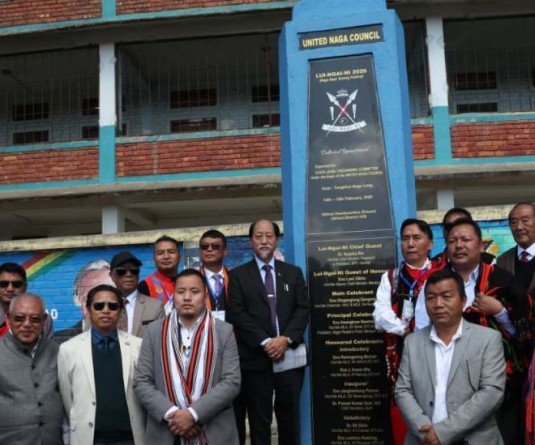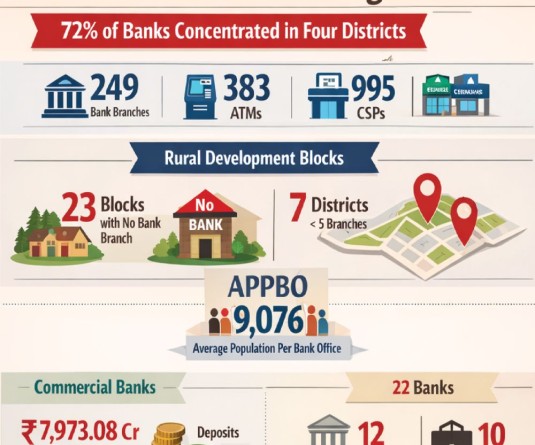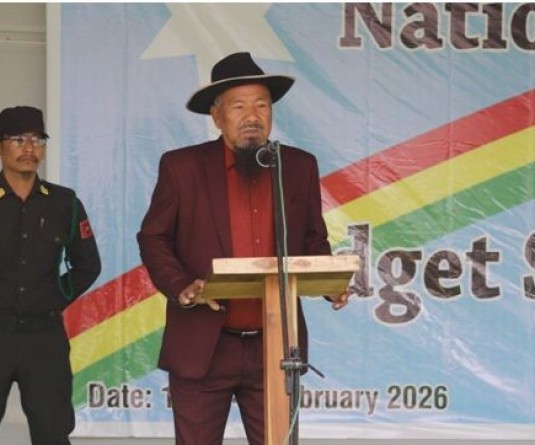.jpg)
Kütsapo, February 18 (MExN): Liberating the Naga spirit is not the liberation of the few," Wati Aier, Convener of the Forum for Naga Reconciliation (FNR), has stated, while asserting, "We must first demonstrate and practice the liberation of the Naga spirit through Christ."
“With Christ, the justification of all Nagas is different from the justification of the few,” he added, addressing the “Nurturing Naga Peoplehood” gathering organised by the Naga Shisha Hoho and FNR in Kütsapo Village in Phek District from February 16-18,
He further stressed that that liberating the Naga spirit is not for revenge, but for freedom from the clutches of evil domination in man and woman and not seeking supremacy, but for the “reign of God in the lives of all.” It is about conquering the evil of divisions and to let go of pride and hate.
The FNR Convenor, however, regretted that at present the Naga spirit of belonging as a nation is held in a “Babylonian captivity,” from which they long for liberation. The Naga nation is tormented by the idols of suspicion, hate, and rage resulting in self-isolation, a deep symptom of fear, anxiety, and guilt, he said. Accordingly, Aier called for honestly reading the signs of the times and immediately acting according to the Word of God by naming the negative powers that have alienated the Nagas from one another and holding the nation captive.
In the Bible, liberation always begins from within, and the Nagas must “look at ourselves from within” and pursue a renewed Nagahood with one another and with God, he stated.
“It is only through Christ that we can be truly human and free as individuals and as a people. Truly, in Christ no boundaries are set…,” he added.
While deliberating about liberating the Naga spirit, the FNR Convenor also called for not forgetting the Naga National Council (NNC) – “the soul of Naga nationalism” which must “remains vibrant and exercise graciousness by building creative-bridges between divides.” By corresponding token, Naga political groups must accept that their roots lie in the NNC, he contended.
Besides, the “Cease-Fire Agreement” of 1997 between the Government of India (GoI) and the NSCN (IM) and subsequent “Framework Agreement” of 2015 as well as the “Agreed Position” of 2017 between the Naga National Political Groups (NNPGs) and the GoI must be recognised as historical landmarks and records of Naga historical and political rights, he added. He also called for acknowledging the sacrificial resolves of thousands of men and women whose commitments to the Naga nation have “given us today to continue sustaining our history contemporaneously.”
The Convenor further urged Naga leaders need to dive into a deeper political analysis of the geopolitical headings besides accepting India’s “understood difficulties” vis-à-vis Naga identity and rights.
“In this case both sides are called to exercise “creative-tension” a categorical necessity of politics,” he said, adding that this would entail moral and political integrity, a test of civilised maturity that requires both the NPGs and GoI to shun self-superiority and hatred.
According to Aier, seemingly small and insignificant events have often caused transformative effects in the history of human civilization and termed the gathering in Kutsapo village as one such event that is “going to produce significant opportunities for the Nagas.”
“We must not leave this gathering without providing a roadmap of the Naga Journey of Common Hope,” he exhorted.
Naga people must find its place in the contemporary world without obliterating the “Historical and Political rights of the Nagas,” he added. He also reiterated that “the more people of different feathers come together the status quo will consider that as formidable. “Let us make our choice now!”






